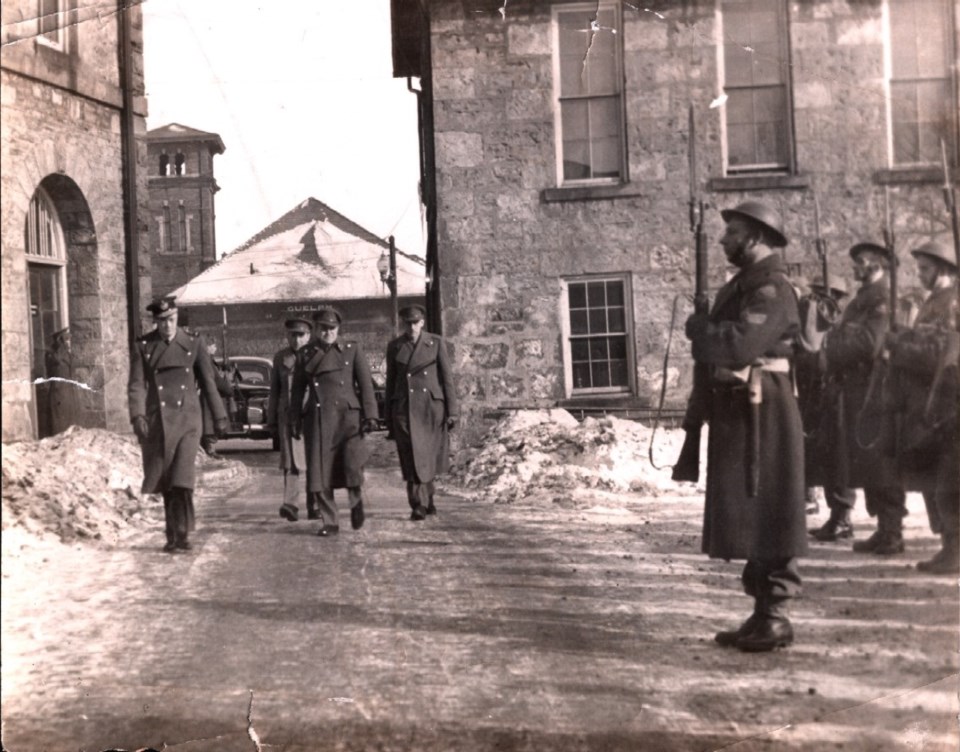There was a time when soldiers of a foreign army walked the streets of downtown Guelph. However, they were not invaders.
During the Second World War, the city’s Winter Fair Building was home to troops of the Royal Netherlands Army. The part that the Canadian Armed Forces played in the liberation of the Netherlands has been well-documented. But Canada’s role as host to Dutch soldiers while their homeland was under Nazi occupation is one of the war’s little-known stories.
When German forces swept into the Netherlands, Belgium and Luxembourg in May of 1940, Queen Wilhemina and the Dutch royal family escaped to England.
The queen refused to recognize the puppet administration Hitler established in the Netherlands, and became head of a Dutch government-in-exile in London. Crown Princess Juliana, the heir to the throne, and her husband Prince Bernhard, took their two small daughters to Canada for safety. They took up residence in Ottawa.
When their third child, Princess Margrait, was born there in 1943, a wing of the maternity ward of Ottawa Civic Hospital was officially [temporarily] declared extraterritorial so she would be strictly a Dutch citizen and have a legitimate place in the line of succession.
Lieutenant-Colonel G.J. “Bert” Sas of the Royal Netherlands Army began the task, with the assistance of the Canadian government, of recruiting male Dutch citizens in Canada who were of military age. It was estimated that there were about 1,500 who were eligible for service.
Dutch immigrants who had become Canadian citizens had the option of serving in the Netherlands army instead of the Canadian armed forces if they so wished. Sas also called on Dutchmen who were living in the still-neutral United States, and in Central and South America to come to Canada and enlist.
The Dutch soldiers in Canada would wear the uniform of the Canadian army and would be subject to Canadian training and military law. It was expected that one day they would go to England to join the Prinses Irene Brigade which was composed of Dutch military units that had escaped the Nazi invasion of their country and the Japanese seizure of Dutch colonies in the East Indies. At that time, they would come under British military authority. Meanwhile, some of the Dutch officers who had escaped to England were sent to Canada to assist with recruiting and training.
In January of 1941 the Dutch soldiers were established at a base in Stratford. However, before the end of the year they were transferred to Guelph. Their new home in the Winter Fair Building was called the Juliana Barracks. More than a thousand Dutch soldiers passed through there on their way to England or other destinations, usually in groups of 50 or 60.
Prince Bernhard visited Guelph in January of 1942 to inspect the Juliana Barracks and make a speech to the troops. It was a rare occasion of the Royal City hosting non-British royalty. Dressed in the uniform of the Netherlands Air Force, the prince told the men that he expected each and every one of them to do his utmost toward the liberation of their country.
Accompanying Prince Bernhard was the managing editor of a Dutch news agency that was now operating out of New York City. He told the Mercury that Canada’s hospitality had touched the hearts of Netherlanders and that they would never forget it.
The Mercury also interviewed a Dutch soldier, private Oscar Koppens, who had first-hand experience of the Nazi regime. He said that life in his hometown of Amsterdam was hard under the severe control of the Germans.
“Nazis before, behind and on every side,” he said.
After a fateful encounter with a spy, Koppens and his pregnant wife fled from Amsterdam. Their perilous route to freedom in Canada took them to Belgium, France, Switzerland, Spain, Portugal and the island of Curacao in the Caribbean. The journey was made all the more difficult by people who preyed on refugees for all the money they could squeeze out of them.
“But in Canada, it is not so,” Koppens said. “Here, there is great kindness and generosity to the stranger.”
In the officers’ mess of the Juliana Barracks, Dutch officers held a reception at which they entertained Guelph Mayor W.G. Taylor and his wife, along with other civic officials and representatives from the local Canadian army reserves and the RCAF Wireless School at the Ontario Agricultural College. In return the Dutch servicemen were invited to a dance and supper at St. James Church and a screening of the British film “One of Our Aircraft Is Missing.”
The movie told the story of the Dutch resistance helping the crew of a downed RAF bomber. In December of 1942, following the escape of German POWs from a camp near Gravenhurst, the Dutch soldiers joined Canadian military and police in a manhunt when one of the fugitives was believed to be in the Guelph area.
The Dutch were in Guelph until October of 1943. Most of them were transferred to England where they did guard duty at POW camps. Some were sent to the Dutch colony of Surinam in South America to protect vital bauxite mines. They participated in the invasion of Normandy in June of 1944, and the subsequent liberation of Belgium and the Netherlands.



